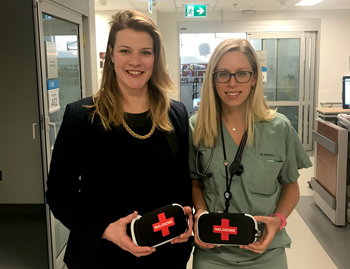Dispensing Naloxone in St. Michael’s Emergency Department is being received positively by patients and families

By Selma Al-Samarrai

Kate MacWilliams, clinical nurse specialist for the ED (left) and ED Registered Nurse Krystal Fox are holding the Naloxone kits dispensed to patients and family members at Unity Health Toronto’s two emergency departments
Last fall, the Emergency Departments (ED) at St. Michael’s Hospital and St. Joseph’s Health Centre began dispensing Naloxone kits, a drug that helps reverse opioid overdoses. Anyone seeking care in the ED because of opioid use has access to a free kit that has lifesaving results
Fast forward six months and ED Registered Nurse Krystal Fox says the team has experienced a largely positive reaction from patients and family members who take a Naloxone kit with them after treatment.
“Often you feel a bit helpless dealing with patients who are living with addictions. They come into our ED with an overdose, we treat them, they leave and then that’s our only interaction with them,” said Fox.
“But with the Naloxone kits, we get a chance to sit with patients in a non-judgmental space and offer them help and advice not only on the dangers of using opioids, but on how to prevent overdose, and the safest way to use opioids which is in the presence of other people. I find it often leaves them with a positive experience with our ED.”
When patients’ overdoses are treated at either of Unity Health Toronto’s EDs, their care team sits down with the patient and their loves ones to discuss addictions resources that are available to them in their community. They also go through the kit using a checklist to make sure they know when and how to use it. Patients can’t use the kit for themselves but they can help save a friend and families can help safe a family member.
“Patients and their families have been very grateful for the kits,” said Fox, recalling a recent encounter she had with a family of a patient who was admitted because of an opioid overdose.
“I was able to sit with and teach the family members and the patient how to use the kit and what to do in case of an overdose, and it felt like the conversation really empowered them. They were so thankful that they’d have an opportunity to save their loved one’s life in case an overdose happens again,” explained Fox.
Kate MacWilliams, clinical nurse specialist for the ED, was part of the team involved in setting up the Naloxone program at St. Michael’s ED and in other mental health services areas. The implementation of the Naloxone program involved external consultations with substance users in the community.
“As health care providers, it’s easy to make assumptions about what you perceive the needs of your patients to be, but you don’t really know unless you ask them,” explained MacWilliams.
The lines of communication remain open as the team continues to collect feedback to enhance the program after its implementation.
The most recent input from the local community shows that some prefer the injectable form of Naloxone to the nasal spray because the spray contains a larger dose that can cause stronger withdrawal symptoms. However, the nasal spray limits risk to the person administering the medication because the injectable form of Naloxone creates the risk for a needle stick injury. Because of this particular consultation feedback, the St. Michael’s ED now carries Naloxone in both forms.
“Providing exceptional care can only be achieved if you include the valuable perspectives of patients and families. In this particular project, the perspectives we received were so important because they came from marginalized community members whose voices are often not heard,” explained MacWilliams.
About St. Michael’s Hospital
St. Michael’s Hospital provides compassionate care to all who enter its doors. The hospital also provides outstanding medical education to future health care professionals in more than 29 academic disciplines. Critical care and trauma, heart disease, neurosurgery, diabetes, cancer care, care of the homeless and global health are among the Hospital’s recognized areas of expertise. Through the Keenan Research Centre and the Li Ka Shing International Healthcare Education Centre, which make up the Li Ka Shing Knowledge Institute, research and education at St. Michael’s Hospital are recognized and make an impact around the world. Founded in 1892, the hospital is fully affiliated with the University of Toronto.
About Unity Health Toronto
Unity Health Toronto, comprised of Providence Healthcare, St. Joseph’s Health Centre and St. Michael’s Hospital, works to advance the health of everyone in our urban communities and beyond. Our health network serves patients, residents and clients across the full spectrum of care, spanning primary care, secondary community care, tertiary and quaternary care services to post-acute through rehabilitation, palliative care and long-term care, while investing in world-class research and education. For more information, visit www.unityhealth.to.
